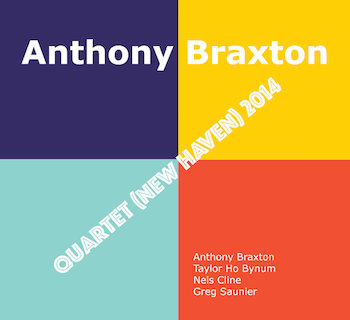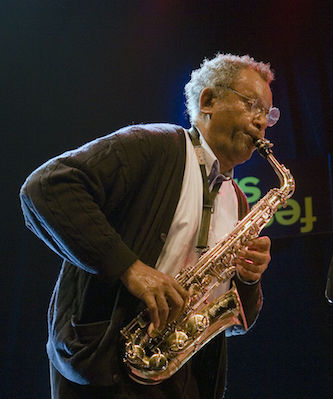Jazz CD Review: Anthony Braxton – Quartet (New Haven) 2014 — Freely Creative Music
By Steve Feeney
This set of discs will be a delight for any fan of advanced (and incredibly sustained) creativity in music.
Anthony Braxton – Quartet (New Haven) 2014, Firehouse 12 Records

Anthony Braxton has been on the cutting edge of progressive music for over 50 years. He pursues a vision that encompasses everything from composing operas and arranging small-group ventures to performing offshoots of what can loosely be labeled (to his dismay) the avant-garde jazz tradition. On Quartet (New Haven) 2014, his fecund imagination is matched with three similarly gifted purveyors of pure expression. It’s not easy listening, but for those with adventurous ears it is totally engaging.
A chance encounter on the way to a European music festival brought the foursome on this 4-disc set together. Nels Cline and Greg Saunier, taking time off from their duties with the groups Wilco and Deerhoof, respectively, met up with Braxton and his musical associate Taylor Ho Bynum. When the latter two heard Cline and Saunier play as a duo, the idea was hatched to get together as a quartet and see what would happen. The ensuing effort at “idiomatic synthesis and collaboration,” as Bynum calls it, is a major document of freely creative music.
Recorded over two days at Connecticut’s Firehouse 12 performance space, Quartet (New Haven) 2014 features Braxton (sopranino, soprano, alto, baritone, bass, and contrabass saxophones), Bynum (cornet, flugelhorn, piccolo, bass trumpets, trumpbone), Cline (electric guitar) and Saunier (drums) diving into four improvisations. Each is about an hour in length and is dedicated to a legendary musician. The sound is electro (thanks to Cline)/acoustic and altogether heady.
“Improvisation One – for guitarist/composer Jimi Hendrix” doesn’t suggest an immediate connection to the dedicatee. That’s not the intent. Still, knowing the title, it’s only a touch fanciful to imagine as you listen that the great Hendrix is playing one of his transcendent solos directly on your spinal cord. It’s a dense but far from cacophonous excursion into collective expression that honors the far-reaching spirit of the late guitar master. Cline adds electronic textures as Braxton and Bynum converse and sputter over Saunier’s crashes. There are quieter, one is tempted to say mournful, moments that take us into a sonic netherworld before the next full-throated passage takes hold.
“Improvisation Two – for vocalist/composer Janis Joplin” has more of a bluesy feel. Braxton’s alto leads the way into a sequence of start and stop cadences. Bynum takes a turn at rapid-fire assertions. Saunier slaps hard at his drums until all four transition to a passage with Cline’s heavily distorted guitar introducing some baritone work from the leader. So much has happened, sonically speaking, and we’re less than a quarter of the way into the piece!
Once again, somber moments break the momentum just enough to set off the next bit of collective effulgence. Braxton proves he hasn’t lost anything off his fastball as he sputters and emotes on top of Saunier’s rumbles. Cline brings the proceedings back into a blues framework that elicits whinnies from Bynum that are reflected in a lower register by Braxton.

Anthony Braxton in action. Photo: Wiki Common.
Cline generally plays quite assertively on this piece. He stretches a number of long tones around Braxton’s soprano — before Saunier’s splashes lead the saxophonist into exhortations that involve circular breathing techniques. A squall moves in to darken the mood, but Braxton, floating above the damp like a butterfly, suggests renewal. The other musicians enter for a final reckoning, replete with a rock-infused drama framed by Cline and topped-off by Braxton’s bass to soprano last words — a flare of sound, perhaps sent to Janis.
You might expect “Improvisation Three – for vocalist/composer James Brown” to be a bit funky. It wants to get into a groove and does, though of the sort that never quite becomes comfortable. A restless energy drives each variation, along with hints of an abstruse sentimentality, exhibited best in an elegiac passage about two-thirds of the way through.
Cline and Saunier are given time to work out a duo passage upon which the others build, no doubt an example of what Braxton envisioned when the inspiration for these sessions first dawned. Bynum muted horn offsets the leader’s sopranino before Cline grunges things up once again and the sax man moves on to low-frequency contrabass rumblings. Hearing this, Brown might indeed have broken out in a “Cold Sweat.”
The man behind the infamous song “Okie from Muskogee” gets the nod on the final disc. I don’t hear much outlaw-country in “Improvisation Four – for guitarist/composer Merle Haggard,” other than just a touch of twang from Cline. These pieces aren’t really about capturing a sound as much as paying resolutely free homage to a musical spirit.
Braxton establishes a whirlwind of sound about halfway through that would make anyone want to either take cover or surrender to its power. Bynum’s muted reflections later approximate an uneasy calm before Cline flips on some sort of electronic buzzsaw that unnerves (?) the others. A wild scramble ensues, with Bynum’s hybrid trumpbone emerging.
Given the variety of concepts and sounds employed by Braxton and Bynum, the haunting electronics from Cline, and the eruptive energy of Saunier, this set of discs will be a delight for any fan of advanced (and incredibly sustained) creativity in music.
Steve Feeney is a Maine native and attended schools in Maine, New Hampshire and Massachusetts. He has a Master of Arts Degree in American and New England Studies from the University of Southern Maine. He began reviewing music on a freelance basis for the Portland Press Herald/Maine Sunday Telegram in 1995. He was later asked to also review theater and dance. Recently, he has added BroadwayWorld.com as an outlet and is pleased to now contribute to The Arts Fuse.
Tagged: Anthony Braxton, Anthony Braxton – Quartet (New Haven) 2014, Firehouse 12 Records, Greg Saunier, Nels Cline, Steve Feeney
